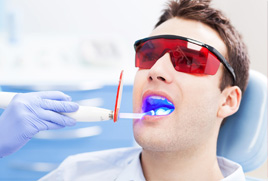What is laser and what is its function in dentistry?
Laser is a linear moving radiation which has condensed energy produced by electromagnetic optical amplifier. In dentistry, this energy is used to cut the tissues by vaporizing the water molecules inside them.
What is laser and what is its function in dentistry?
Laser is a linear moving radiation which has condensed energy produced by electromagnetic optical amplifier. In dentistry, this energy is used to cut the tissues by vaporizing the water molecules inside them.
What are the advantages of laser in dental treatments?
With laser, surgical operations can be performed without bleeding. Anesthesia is not necessary in minor operations. It makes us save the time both during operation and in recovery process.
What is the role of laser in bleaching?
Compared with classic methods, dental laser would lessen application time and increase the permanence of bleaching.
Is dental laser safe for pregnant and nursing mothers?
Lessening the time spent for treatment and recovery, laser applications decrease the amount of anesthesia used. There will be no risk of infections. Thus, it provides advantage. However, even with laser, bleaching is not recommended during these periods.
How is dental implant placement with dental laser performed?
In certain phases of implant placement, laser is used to cut the gums. Thus, bloodless intervention is possible without any cuts and sutures.
Do treatments with laser bring extra cost?
At DentGroup clinics, there is no price difference between treatments with laser and without laser.
Is laser applied to the same spot twice?
Laser application does not have any drawbacks when it is applied in a controlled way.
Does dental laser work on sensitive teeth?
When there is tooth sensitivity due to gum recession, dentinal tubules can be sealed with laser apart from fluor applications and special toothpastes. Hence, sensitivity is treated. It is periodically used for tooth sensitivity. If the intended results are not achieved, treatment can be applied several days later.
Can pigmentations on the gums (purple spots) be treated with dental laser?
Hyper pigmentation due to pigment increase on gums can be treated with classic methods by peeling with bistouries under local anesthesia in 3-4 sessions. Pigmentation treatments with laser requires either very little or no anesthesia. You do not feel any pain after treatment.
How do you use dental laser in smile design or cosmetic dentistry (pink aesthetics)?
There is no bleeding after cutting or shaping gums in addition to using less anesthetic solutions than standard method. Recovery of the tissues is much quicker. If it is required, other operations can be performed without waiting. With these qualities, it is more advantageous than classic methods in smile designs.
What is filling using laser?
Contrary to popular belief, the light which is used for composite-white fillings is not laser. For fillings, dental curing lights or LED devices are used.
Does dental laser cause allergic reactions?
Any scientific evidence that laser causes allergic reactions is not observed.
What are its advantages in treating gums?
Laser use in gingival curettage and scaling gives you advantage in disinfection and treatment of gum pockets.
Is dental laser used during root canal treatments?
Laser is used to disinfect the roots especially in treating gums which have chronic abscess and difficult-to-treat infections. So, there is no need for antibiotics use for a long time.
Is there any harm of dental laser use on children?
There is no harm of laser use on children if it is used in a controlled way as on adult patients. The point to take into consideration is that permanent teeth underneath it must not be harmed.
Can canker sores and cold sores be treated with laser?
After applying laser on canker sores and cold sores, their normal recovery time lessens and they do not occur on the same area.
What is the purpose of dental laser in surgery?
Laser is used in various phases of surgical operations due to the fact that it decreases bleeding and harms little amount of tissues. Complications such as swelling, bruising or pain do not occur after laser supported surgical operations.
Is dental laser used in every surgical operation?
It is required that laser is used with other methods in operations of hard tissues such as bones and large areas.
However, it is preferred in operations such as removal of tissue lesions, cutting tongue, check and lip ties without bleeding and sutures, and performing biopsy.





